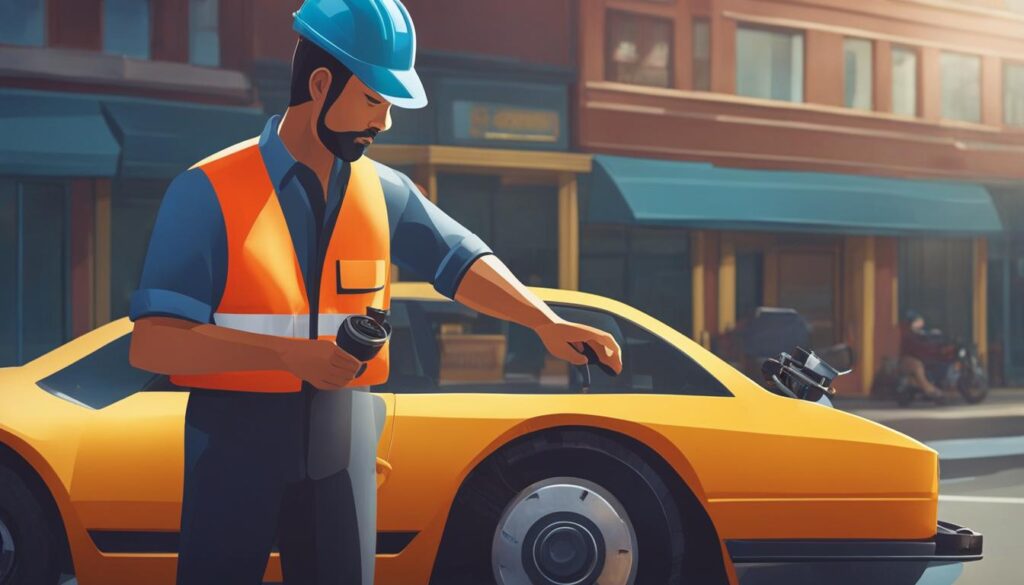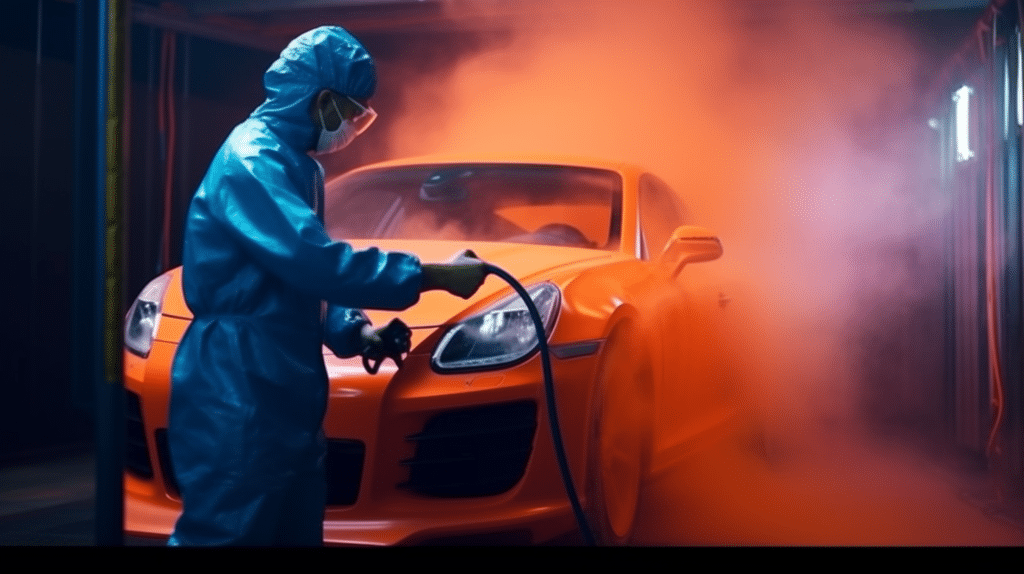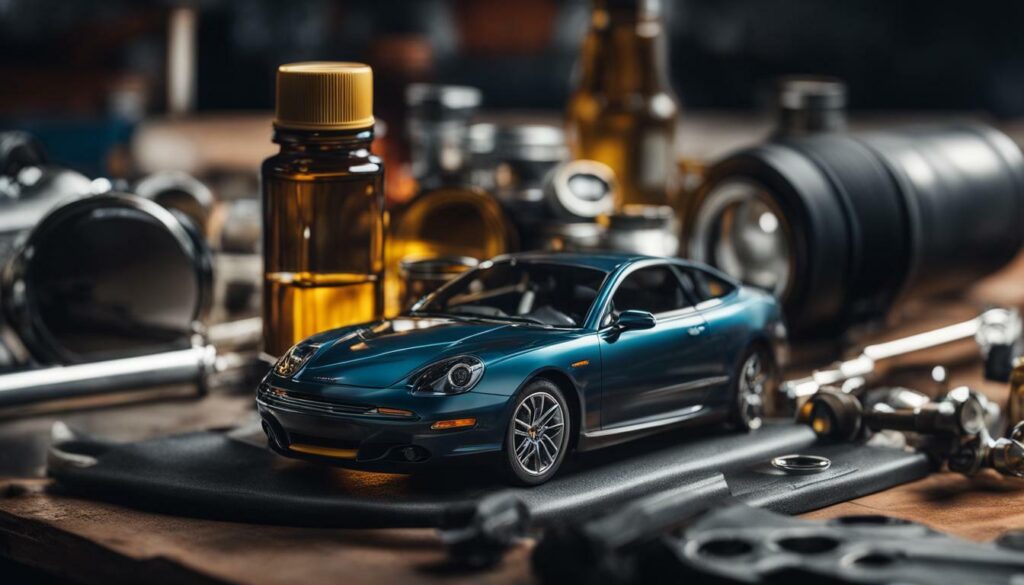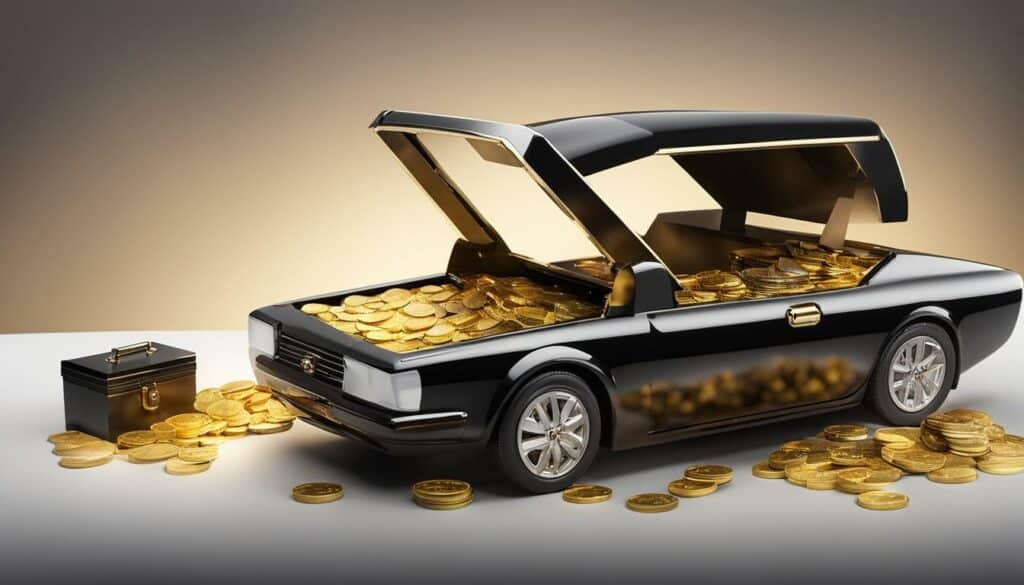As a professional copywriting journalist, I have come across many car owners who have experienced issues with their vehicles cutting out when slowing down. This can be a frustrating and stressful problem, especially if you’re on the road. In this article, I will discuss the common causes of car stalling and provide effective prevention techniques to avoid engine shutdown and prevent car stalling.
Key Takeaways:
- Understanding the causes of car stalling can help prevent engine shutdown.
- Issues with fuel delivery, ignition system, electrical system, transmission, and clutch can cause car stalling.
- Regular maintenance, maintaining adequate fuel levels, and being mindful of braking techniques can help prevent car stalling when slowing down.
Understanding the Causes of Car Stalling
As a car owner, few things are more frustrating than a car that stalls frequently, especially when slowing down. Understanding why your car cuts out when slowing down can help you take necessary preventive measures and avoid engine shutdown. Troubleshooting car stall issues requires a keen understanding of various causes.
Common Reasons for Car Cutting Out
The following are some of the most common reasons for car stalling when slowing down:
- Fuel delivery issues such as clogged fuel filters or faulty fuel pumps
- Ignition system problems like malfunctioning ignition coils or spark plugs
- Electrical issues such as a weak battery or faulty sensors
- Transmission and clutch problems like a worn-out clutch or transmission fluid leaks
When you experience stalling, it’s important to identify the specific problem affecting your vehicle to apply the right solution.
Troubleshooting Car Stall Issues
If your car stalls frequently when slowing down, the following are steps to troubleshoot the problem:
- Check the dashboard for any warning lights, which can help pinpoint the problem
- Inspect the fuel system for issues, including checking for clogs, leaks, or fuel pump problems
- Examine the ignition system, including checking the spark plugs, ignition coils, and ignition switch for any faults
- Test the battery, alternator, and electrical connections to identify any issues that may cause car stalling
- Inspect the transmission and clutch for wear and tear or fluid leaks that could be affecting the vehicle’s performance
By following these steps, you can identify specific problems and implement the right solutions to prevent car stalling.
Fuel Delivery Problems and Stalling
When it comes to car stalling, fuel delivery problems are a common culprit. If there is an issue with the fuel system, your engine may not be receiving enough fuel to function properly, resulting in engine failure or stalling when slowing down.
One of the main causes of fuel delivery problems is a clogged fuel filter. A dirty or clogged fuel filter can restrict the flow of fuel to the engine, leading to stalling. Luckily, this is an easy issue to fix through regular maintenance. It is recommended to replace the fuel filter every 20,000 to 30,000 miles or as suggested in your vehicle’s manual.
Faulty fuel pumps can also cause fuel delivery problems and stalling. The fuel pump’s job is to supply fuel to the engine at a specific pressure. If the fuel pump is faulty or worn out, it may not be able to provide the required amount of fuel, leading to stalling. If you suspect an issue with your fuel pump, it is crucial to get it checked by a mechanic to ensure proper functioning and prevent engine failure when slowing down.
Tips to Prevent Fuel Delivery Problems and Stalling
Regular maintenance is key to preventing fuel delivery problems and stalling. Here are some tips:
- Replace the fuel filter every 20,000 to 30,000 miles or as suggested in your vehicle’s manual.
- Use high-quality fuel from reputable gas stations to avoid contaminated fuel issues.
- Be mindful of how much fuel you have in your tank and avoid letting it run too low.
- Address any fuel system issues promptly to avoid engine failure when slowing down.
By taking these preventive measures, you can maintain a reliable fuel delivery system in your vehicle and avoid the frustration of stalling when slowing down.
Ignition System Issues and Stalling
One of the most common reasons why cars stall when slowing down or braking is due to ignition system issues. The ignition system is responsible for creating a spark that ignites the air-fuel mixture in the engine, thus initiating the combustion process that powers the car. Therefore, any malfunction in the ignition system can disrupt the smooth operation of the engine, causing the car to stall.
There are several potential ignition system problems that can cause stalling:
- Faulty spark plugs: Over time, spark plugs can become worn out or dirty, leading to weak or intermittent sparks that fail to ignite the fuel mixture. This can result in misfiring, reduced engine power, and ultimately, stalling.
- Malfunctioning ignition coils: Ignition coils are responsible for converting the battery voltage into the high voltage needed to create a spark. If one or more of the coils fail, there may not be enough spark energy to ignite the fuel mixture, leading to stalling.
- Ignition switch problems: The ignition switch is responsible for initiating the entire ignition process. If there’s an issue with the switch, such as a loose connection or a faulty component, the car may not start properly, or it may stall when slowing down.
If you’re experiencing stalling issues when slowing down or braking, it’s essential to have your ignition system checked by a qualified mechanic. They can perform a diagnostic check to identify any faulty parts, such as spark plugs or ignition coils, and replace them as needed.
Additionally, there are several steps you can take to prevent ignition system problems and subsequent stalling:
- Perform regular maintenance: Regularly check your spark plugs, ignition coils, and other ignition components for wear and tear, and replace them as needed. This can prevent problems from developing and ensure that your ignition system operates smoothly.
- Be mindful of braking: Avoid sudden and excessive braking, as this can cause the engine to stall. Instead, brake gradually and consistently to maintain a steady speed.
- Keep your fuel tank at least half full: Running your car on a near-empty tank can cause the fuel pump to overheat, leading to potential ignition problems and stalling.
By following these preventive measures and addressing any ignition system issues promptly, you can avoid stalling and ensure a smooth driving experience.
Electrical Problems and Stalling
While fuel and ignition issues are the most common reasons for car stalling, electrical problems can also contribute to this frustrating issue. A weak battery, malfunctioning alternator or faulty sensors can disrupt the electrical system of your car, leading to unexpected stalling when slowing down or stopping.
To prevent these electrical issues, it’s vital to keep your car’s electrical system in top condition through regular maintenance. Be sure to test your battery periodically, and replace it if necessary. Additionally, have your alternator and sensors checked by a professional mechanic on a regular basis.
One way to avoid electrical problems leading to stalling is to avoid leaving your car’s electrical systems on when the engine is not running. This can put unnecessary strain on your battery and alternator, reducing their overall lifespan and causing problems down the road.
Tip: If you notice that your car’s battery is weak or that your alternator is failing, address the issue promptly to avoid more severe and expensive problems.
Transmission and Clutch Problems Leading to Stalling
Another common cause of car stalling when slowing down is transmission or clutch problems. These components are responsible for transmitting power from the engine to the wheels, and any issues that hinder their smooth operation can result in stalling.
If your car has a manual transmission, a worn-out clutch can be a culprit for stalling. Over time, the clutch plates can wear down, making it harder for them to engage and disengage smoothly. This can cause the engine to stall when you slow down or stop the car. Checking the clutch’s condition during regular maintenance can help prevent this issue.
If your car has an automatic transmission, the torque converter can also lead to stalling. A malfunctioning torque converter can cause a delay in the transmission’s engagement or prevent it from engaging entirely, leading to stalling when slowing down. Checking the transmission fluid levels and addressing any leaks or issues during regular maintenance can prevent these problems.
In addition to these issues, other transmission problems like a slipping transmission or a clogged transmission filter can also lead to stalling. Any symptoms of these issues, such as difficulty shifting or strange noises, should be addressed promptly to avoid stalling.
Troubleshooting Tips for Transmission and Clutch Issues
If you are experiencing stalling due to transmission or clutch problems, the following troubleshooting tips may help:
- Check the clutch’s condition (for manual transmissions) during regular maintenance
- Monitor transmission fluid levels and address any leaks or issues
- Pay attention to any symptoms of a slipping transmission or clogged transmission filter
- Take your car to a trusted mechanic for a diagnostic evaluation
By following these tips and addressing any transmission or clutch issues promptly, you can prevent car stalling and ensure a smooth driving experience.
Tips to Prevent Car Stalling When Slowing Down
Experiencing your car stalling when slowing down can be frustrating and potentially dangerous. To avoid this issue, there are several tips and preventive measures you can follow:
- Regular maintenance: Keeping your vehicle well-maintained is crucial to preventing car stalling. Regular tune-ups, oil changes, and check-ups can help detect and fix any potential issues before they become bigger problems.
- Keep fuel levels adequate: Running low on fuel can put a strain on the fuel delivery system and cause stalling. Make sure to keep your fuel tank at a level above a quarter tank.
- Be mindful of braking techniques: Sudden and harsh braking can cause your vehicle to stall. Instead, try to brake gently and smoothly to avoid stalling.
- Address any issues promptly: If you notice any warning signs, such as unusual noises or vibrations, don’t ignore them. Addressing issues as soon as they arise can prevent them from escalating and causing stalling.
By following these preventive tips, you can avoid the frustration and potential danger of car stalling when slowing down. Remember to always prioritize safety and keep your vehicle well-maintained to ensure a smooth driving experience.
Conclusion
In conclusion, understanding the causes of car stalling and implementing preventive measures is essential to avoid the frustration of your car cutting out when slowing down. By identifying issues related to fuel delivery, the ignition system, electrical components, and the transmission and clutch, you can ensure a reliable and efficient vehicle. Regular maintenance is crucial to prevent car stalling, and it is important to keep the fuel levels adequate and be mindful of braking techniques.
Implementing the practical tips and suggestions provided in this article can minimize the risk of your car cutting out and ensure a smooth driving experience. Remember to troubleshoot any issues by examining common causes and seeking professional help if necessary. With a well-maintained vehicle and a cautious driving approach, you can avoid car stalling and enjoy a safe and uninterrupted driving experience.
Thank you for reading this article on preventing car stalling. We hope that you found it informative and helpful in addressing any issues related to engine shutdown. Stay safe on the roads, and happy driving!
FAQ
Why does my car cut out when slowing down?
There can be several reasons why your car cuts out when slowing down. It could be due to fuel delivery problems, ignition system issues, electrical problems, or transmission and clutch problems. Identifying the specific cause will help in finding a solution.
How can I prevent my car from stalling?
Preventing car stalling involves regular maintenance, such as checking the fuel filters and pumps, spark plugs, ignition coils, and sensors. Additionally, keeping fuel levels adequate and practicing proper braking techniques can help avoid engine shutdown.
What are some common causes of car stalling?
Some common causes of car stalling include clogged fuel filters, faulty fuel pumps, contaminated fuel, malfunctioning spark plugs, ignition coils, ignition switch issues, weak batteries, malfunctioning alternators, faulty sensors, worn-out clutch, transmission fluid leaks, and malfunctioning torque converters.
How can I troubleshoot a car stall issue?
Troubleshooting a car stall issue involves carefully examining the fuel delivery system, ignition system, electrical system, and transmission and clutch components. Checking for any signs of damage or malfunction and seeking professional advice if needed can help identify and resolve the issue.
What preventive measures can I take to prevent car stalling?
To prevent car stalling, it is important to maintain a smooth fuel delivery system by regularly inspecting and replacing clogged fuel filters, ensuring proper functioning of fuel pumps, and using clean fuel. Additionally, regular maintenance of the ignition system, electrical system, and transmission and clutch components is crucial.




